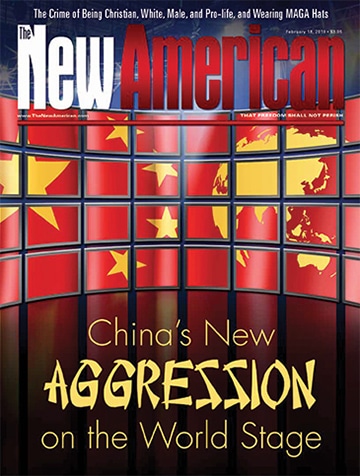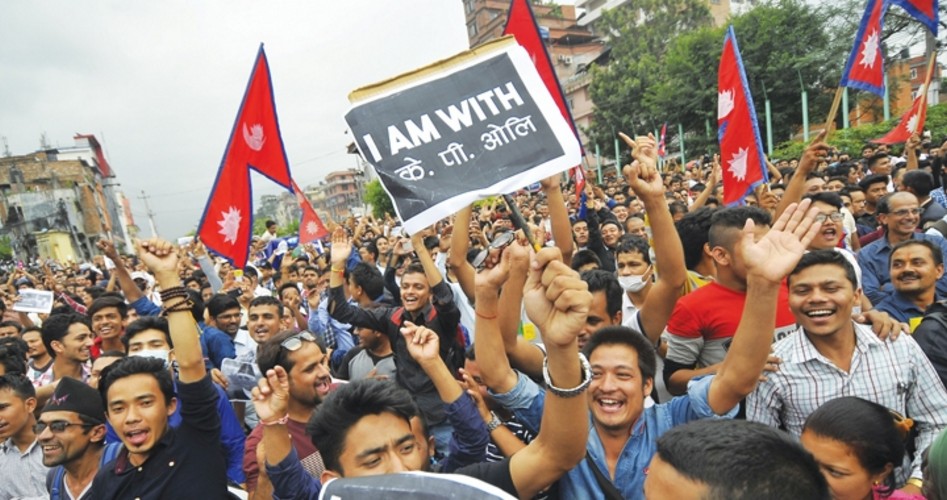China’s New Aggression on the World Stage
In 2015, the most overlooked communist revolution in history took place. That was the year that communists seized power in the Himalayan nation of Nepal via ballot-box revolution. For a decade, from 1996 to 2006, the Maoist Communist Party of Nepal, with the not-so-covert backing of the Chinese, waged a bitter civil war against the Nepalese government, seeking to overthrow the monarchy and replace it with a People’s Republic. The insurgency included a number of attacks on foreign trekkers in the popular mountaineering and hiking destination.
In 2006, the communists laid down their arms in exchange for a peace treaty granting them the right to participate in Nepalese politics. At the time, it was estimated that the communists controlled 80 percent of rural Nepal. And in 2015, after nine years of electoral agitation, the Nepalese Communists, led by longtime revolutionary leader Khadga Prasad Sharma Oli, finally achieved their political goal, sweeping into power in that year’s popular election.
The election sent shock waves across the region, where Nepal has long been aligned with pro-Western India and opposed to the Communist Chinese behemoth on its northern border. Given China’s longtime support of Nepal’s communists, it was expected that Nepal might turn northward in search of new alliances.
Now, the worst fears of India and the West are coming to pass. In 2018, for the first time, the Nepalese government refused to participate in annual South Asian military exercises aimed at combating terrorism in the region, and Nepal’s top general declined to attend a gathering of other military leaders from the region at the same time. But Nepal announced it will soon be participating in joint military exercises with China.
Nor have the Chinese failed to shower rewards on their newfound friend and ally. In June of 2018, the Chinese government announced a deal with Nepal that will see the construction of a new railway link extending from Chinese Tibet all the way to the Nepalese capital of Kathmandu. The project is part of China’s ambitious new “Belt and Road” project to construct infrastructure all across Eurasia, and even overseas, ostensibly to better link China, with its vast markets, to the rest of the world. The program being pursued in Nepal has become the model for how Communist China is now methodically advancing its interests all over the world. In effect, the Chinese government offers to build (or rebuild) infrastructure in a country, in exchange for greater access to that country’s markets — as well as political allegiance, if not outright alliance. A number of countries, such as Turkey and Sri Lanka, are taking advantage of this initiative, and many others, strapped for cash and weary of what they perceive to be onerous and compromising conditions imposed by Western creditors and providers of foreign aid, are seriously considering China’s blandishments.
A scan of the socio-political scene involving China reveals that the country aims to dominate the globe — as a communist power. At home, China is not only presently retrenching socially — cracking down on and even disappearing anyone who appears to be a dissident — but outwardly it is using the technology and wealth fed to it by companies clinging to the futile hope that China will open its markets to them to build a sphere of world control. Its methods use the carrot-and-stick approach: When bribes don’t work, subversion and savagery are employed.
In the case of Sri Lanka, the government of that debt-ridden country was recently compelled to sign over most of the rights to a major southern port, Hambantota, to the Chinese on a 99-year lease in exchange for a substantial amount of debt forgiveness. Hambantota’s location, right on the major east-west shipping lane from the Suez Canal to Singapore and the Far East, via Sri Lanka’s south coast, gives China unprecedented access to one of the world’s major commercial sea routes — as well as a potential military vantage point over the entire Indian Ocean. After a popular uproar in Sri Lanka over the move, the Chinese government shelled out $300 million in grant money for the Sri Lankan government to use any way it pleased — underscoring how important China’s hold on Sri Lanka has become for its strategic interests. And China, flush with cash, is proving more willing than Western countries such as the United States to dole out supposedly no-strings-attached financial aid, such as its recent gift to Sri Lanka, causing many countries to set aside reservations over China’s true motives and begin questioning their alignment with the West.
The “Belt and Road” project (literally “One Belt, One Road” in Chinese), of which China’s Sri Lanka activities are only a small part, was launched by Chinese President and General Secretary of the Communist Party Xi Jinping in 2013. According to the Chinese government, it is nothing less than a modern re-creation of the ancient land and sea trading routes that linked China with the rest of the world, a sort of 21st-century Silk Road.
In point of fact, President Xi’s Belt and Road initiative has coincided with a very significant Chinese military buildup and with a dramatic rise in Chinese Communist subversion abroad, in places as far-flung as South Africa, where the ruling African National Congress is now transparently allied with (and receiving training from) the Chinese Communists. All of these indicators point unmistakably to a China that has decided to take the place of the defunct Soviet Union as the world’s chief sponsor and military backer of the global communist movement.
For nations caught in the Chinese Communist net, the effects are increasingly worrisome. Nepal’s communists have recently passed legislation outlawing Christian missionary activity in Nepal, making charitable activity by any Christian-affiliated NGO illegal, and even curtailing the right of Nepalese to criticize the government. This is socialist incrementalism at its best, backed by the world’s most patient and calculating totalitarian regime.
In China, meanwhile, the Communist Party is once again consolidating power at home as it attempts to undo several decades of market reforms that began under premier Deng Xiaoping. Following Deng’s lead, the nation once so cowed by communist tyranny that even modes of dress were dictated by the government (a dictatorial excess even Stalin’s Soviet Union did not approach) shed the drab party-mandated clothing for Western fashion, developed a taste for Western music and media, and even began traveling more or less freely abroad, including to the United States and other Western nations.
But beginning in 2012, when Xi Jinping came to power, the Communist Party began a slow but steady movement back toward its totalitarian past. Crackdowns, arrests, and imprisonments soared in the name of a new ongoing “anti-corruption” campaign targeting everything from street vendors to drug users to critics of the government. In July China’s most prominent film actress, Fan Bingbing, vanished for several months, leaving her millions of fans worldwide to speculate about her fate. Fan was the world’s fifth highest-paid actress in 2016, according to a Forbes ranking, and was a regular at film festivals across the world, from Cannes to Busan. The multitalented actress speaks fluent English and has also appeared in a number of Hollywood movies.
As it turned out, she was detained for several months on charges of tax evasion. Other public figures have similarly fallen from the graces of the Communist Party in recent years. Not only that, the Chinese government has shown a willingness to arbitrarily arrest foreigners for political leverage, as evidenced by the recent jailing of several former Canadian diplomats in obvious retaliation for Canada’s detention of the CFO of Huawei, one of China’s most powerful corporations, on charges of giving aid to Iran in violation of international sanctions.
The disappearance of popular figures who have fallen into party disfavor and politically motivated attacks on foreign citizens were once routine in Maoist China, Stalinist Russia, and other totalitarian regimes, and continue to be the norm in the likes of North Korea and Iran. And for years, it appeared as though China had moved beyond such episodes.
But worse may be soon in coming as Xi continues to consolidate power. This year, he removed the two-term limit on the Chinese president and vice-president, making himself in effect leader for life, if he chooses. His anti-corruption campaign has morphed into an ambitious drive to transform China into a panopticon state. A network of new cameras watches Chinese citizens everywhere they walk or drive, while government software compiles data on tens of millions of them, assigning them a number similar to a credit score — except that these scores reflect a citizen’s loyalty to the party, obedience to the state, and general sense of civic duty.
Points are taken off for jaywalking, late bill payments, criticizing the government, buying too much alcohol, and many other activities deemed deleterious by the Communist Party. If their score drops too low, hapless Chinese citizens will be denied air and rail travel, refused access to social networks, and kept from finding gainful employ. Still under consideration are additional “social infractions” such as playing too many video games, spending money wastefully, or making too many posts on social media.
Photo credit: AP Images
This article appears in the February 18, 2019, issue of The New American.


